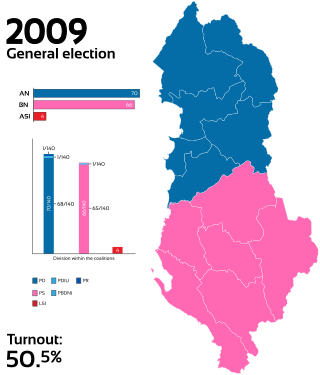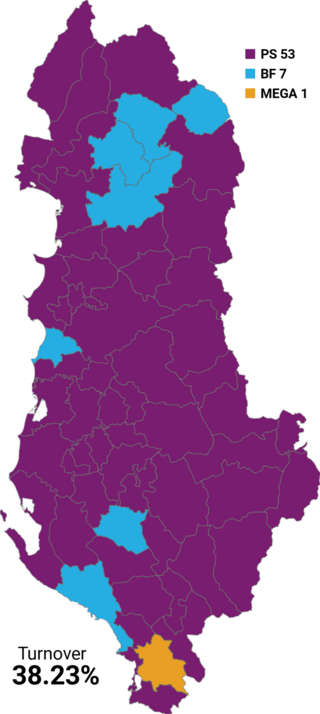| |||||
| Decades: | |||||
|---|---|---|---|---|---|
| See also: | Other events of 2011 List of years in Albania | ||||
The following lists events from the year 2011 in Albania .
| |||||
| Decades: | |||||
|---|---|---|---|---|---|
| See also: | Other events of 2011 List of years in Albania | ||||
The following lists events from the year 2011 in Albania .
March 30- 3.4 Earthquake in Gjrokastra
November 30: Death of Leka, Crown Prince of Albania, in Tirana.
December 30: New Year's Eve Terrorist Attack On A Hotel In Durrës

Sali Ram Berisha is an Albanian cardiologist and conservative politician who served as the president of Albania from 1992 to 1997 and 32nd prime minister from 2005 to 2013. Berisha serves as Chairman of the Democratic Party of Albania since 2022 and has held the position previously from 1990 to 2013. He also serves as the incumbent Leader of Opposition in the Albanian parliament.

Edi Rama is an Albanian politician, painter, writer, former university lecturer, publicist and former basketball player, who has been serving as the 33rd and incumbent Prime Minister of Albania since 2013 and chairman of the Socialist Party of Albania since 2005. He was appointed Minister of Culture, Youth and Sports in 1998, an office he held until 2000. First elected mayor of Tirana in 2000, he was reelected in 2003 and 2007.

The Democratic Party of Albania is a conservative political party in Albania. It has been the largest opposition party in the country since 2013.

Ilir Rexhep Meta is an Albanian politician. He served as the president of Albania from 24 July 2017 to 24 July 2022.

In 1997, widespread civil unrest struck Albania due to economic problems in the country that were caused by the collapse of pyramid schemes. Due to the large quantities of money robbed from the government to fund the schemes, the Democratic Party's government collapsed in January 1997. More than 2,000 people were killed in the conflict until its end in August 1997. The creation of a new government came as the revolutionaries surrounded Tirana. Various other sources also describe the violence that ensued as a rebellion or even a civil war.
The fall of communism in Albania, the last such event in Europe outside the Soviet Union, started in December 1990 with student demonstrations in the capital, Tirana, although protests started in January that year in other cities like Shkodra and Kavaja. The Central Committee of the communist Party of Labour of Albania allowed political pluralism on 11 December and the largest opposition party, the Democratic Party, was founded the next day. March 1991 elections left the Party of Labour in power, but a general strike and urban opposition led to the formation of a "stability government" that included non-communists. Albania's former communists were routed in elections in March 1992 amid economic collapse and social unrest, with the Democratic Party winning most seats and its party head, Sali Berisha, becoming president.
In 1991, the Socialist Party of Albania, with specific social democratic ideology took control of the country through democratic elections. One year later the Democratic Party of Albania won the new elections. After 1990, Albania has been seeking a closer relationship with the West. What followed were deliberate programs of economic and democratic reform, but the implementation of capitalism led to the proliferation of pyramid schemes. Chaos in late 1996 to early 1997, as a result of the collapse of these pyramid schemes, alarmed the world and prompted the influx of international peacekeeping forces. In 1995, Albania was accepted into the Council of Europe and requested membership in NATO and is a potential candidate country for accession to the European Union. The workforce of Albania has continued to emigrate to Western countries, especially Greece and Italy.

Parliamentary elections were held in Albania on 28 June 2009. No alliance achieved 71 deputies on its own needed to form a parliamentary majority. A coalition government was formed by the Democratic Party and Socialist Movement for Integration.

Petrit Vasili is an Albanian politician. He was the chairman of Socialist Movement for Integration party and minister of health in the cabinet of Sali Berisha.

The Republican Guard is a paramilitary government agency of Albania mandated by law to protect high-ranking state officials, including the President of Albania, as well as certain national properties, high-ranking foreign visitors and diplomatic offices. It is mostly subordinate to the Ministry of Internal Affairs, except that the unit responsible for the president's security being under the authority of the president.

The 2011 Albanian opposition demonstrations were a series of Antigovernment protests in cities around Albania following 18 months of political conflict over alleged electoral fraud by the opposition. A video surfaced which portrayed the deputy prime minister arranging a corrupt deal with the minister of economy. The public outcry over the video resulted in the resignation of the deputy prime minister, Ilir Meta. A demonstration was called by parliamentary opposition parties, which include the Socialist Party and the Unity for Human Rights Party. These were called on 21 January in order to protest the alleged corruption of the Albanian government as well as widespread unemployment and poverty in the country.
The Fino Government better known as the Government of National Reconciliation was a caretaker government that presided over Albania from 13 March 1997 to 24 July 1997, during the Albanian unrest of 1997. It was created as a result of the social, economic, and political turmoil of early 1997, spurred by the collapse of pyramid schemes and the subsequent loss of many Albanians' life savings. This government was formed in the week following the resignation of the government of Aleksandër Meksi on 1 March 1997 by the major political parties of the country with international support. The Government was voted in the morning session at 10:00 a.m. on 12 March 1997, while received the approval of the President Sali Berisha shortly before midnight on the same day.
The following lists events that happened during 2009 in Republic of Albania.
The following lists events that happened during 2008 in Republic of Albania.
The following lists events in the year 2017 in Albania.

The 2017 Albanian opposition protests were a series of anti-government protests, largely in Tirana, which centered around poverty, corruption, the illicit drug situation in Albania, fear of electoral fraud in the parliamentary elections, and alleged manipulation of the voting process by the government.
Starting from 16 February 2019, the opposition parties organized a series of protests and rallies against the government to demand new elections and the formation of a technocrat government that would ensure the fairness of the electoral process, citing electoral fraud and corruption in the government as the main reasons for the need for change.
Events from the year 2020 in Albania.

Local elections were held on 14 May 2023 in Albania. Mayors and municipal council seats were being elected in each of Albania's 61 municipalities.
Events in the year 2023 in Albania.